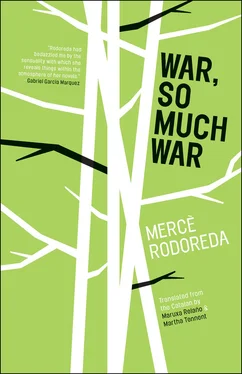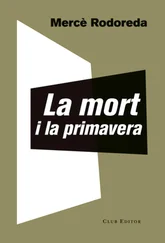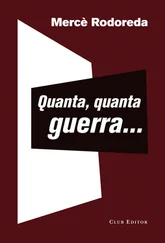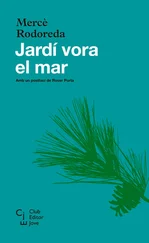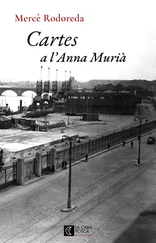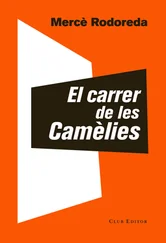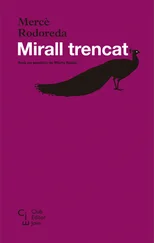
It fell to me to bury him. Aided by some kindly soul, the rector of the parish had fled the village at the beginning of the revolution. The gravedigger had gone to live with a sister who was as ancient as he was. The church had been emptied of saints, and an old farmer who had been an altar boy as a child had taken it upon himself to ring the hours. Children played in the streets with the candelabras that had stood on the high altar, a gift from the masters of the house where old Isabel had served, people, who like so many others, had died with their faces to the wall.
I dug a pit in the corner of the cemetery, after first removing quite a bit of dogwood. Five spans beneath the earth, bones began to appear; I picked one up as one would a branch. It was blackened and decayed; whether it had belonged to an arm or a leg I could not say. A young boy was watching and asked if he could have it. Will you give it to me? He took it and ran away jumping and shouting, it’s from a dead person! I have the bone of a dead person! The man who brought us wood, having been notified by Senyora Isabel, helped me carry the proprietor of the house by the sea to the cemetery and lower him into the earth. On top we placed a few stones that we took from the pile beneath the window of the girl I saw undressing for bed.

That night, after Senyora Isabel had left, I opened the envelope. Inside was a thick sheet of paper and, in a clear handwriting, the words: “I bequeath all my possessions, furniture and property to Adrià Guinart, who has kept me company until the hour of my death. In exchange I ask one last favor of him: that he shred and burn all my documents. Pere Ardèvol.” Seated at the desk in the library, I began to peruse his papers. There were many, all of them carefully classified in faded folders. Letters to a bank in Barcelona, letters to the village mayor discussing some land Senyor Ardèvol wanted to sell. Letters from a friend, Esteve Aran, dated in Arenys de Mar, in which the friend spoke of the mystery of dreams and the memories of another life. In the last of these letters the friend announced that he would soon be paying Senyor a visit. In a file bound with greater care than the rest was a group of papers that spoke only of mirrors. Senyor Ardèvol stated at the beginning of these that each person is the mirror of the entire universe. Of God. And then I came across some sheets of paper — written in a handwriting that was difficult to make out — that explained how he had come to that house and told the story of the mirror in the foyer. The new day found me still reading.
IN HIS PAPERS, SENYOR ARDÈVOL EXPLAINED THAT HE HAD RECEIVED an inheritance from his uncle at the age of twenty-two. He was orphaned when he was very young and didn’t remember a thing about his parents. They had both died at the same time, and the circumstances of their death had remained a mystery, at least to him. Nobody had ever told him how or when those who put him on this earth had passed away.
On one occasion, in a chest of drawers at his uncle’s apartment, he had come across a portrait of a beautiful woman with light-colored hair and eyes. It was summer, and the discovery of that portrait would be forever fused in his memory with the smell of wilted flowers and afternoons that seemed to never end. Years later, as a way of shoring himself up when depression struck, he would remember that photograph, hoping it was of his mother. Trying to feel the warm caress of those hands on his forehead, cleansing him of whatever bad he carried within him.
He had had little contact with his Uncle Hipòlit. He was an amiable man, who spent his life calling on others, always arriving with tins of bonbons or boxes of pastries for the ladies, always keen to play cards with their husbands. But he never received anyone in his own home. He lived alone in Barcelona, in an apartment on Carrer Aragó that was richly appointed with fine old furniture, authentic rugs, thick wooden doors, and stained glass windows. His uncle’s fortune consisted of a house in a coastal village, many hectares of land and a more than respectable amount of securities — a term I was not familiar with but I assumed referred to some sort of valuable documents. In his younger years, Senyor Ardèvol had lived with his nanny, a country woman who was worth more than her weight in gold. She had instilled in him the notion that growing wheat was the most important endeavor in the world, and that a well-formed cabbage was of greater merit than a gentleman in patent-leather shoes and a satin-trimmed jacket. As soon as he was old enough, his uncle locked him away in a boarding school. All that had once been skies and open fields, freshwater springs and chirping birds, was replaced by walls with peeling paint and high windows with foggy panes. Expelled for bad behavior, he bounced from one school to the next. When it came time to choose a career, after much thought, he decided on architecture. His uncle then lodged him in a family-run pension uptown. Each month, to cover his expenses, he sent him a sum of money that was neither too substantial nor too paltry. He spent Christmas and his uncle’s Saint’s Day at the apartment on Carrer Aragó. In his papers, Senyor Ardèvol described his uncle as a quiet man, with nervous eyes, droopy eyebrows, a prominent jaw and a short neck, a man of few words, orderly and well-mannered. But then one year the customary Christmas invitation never arrived. He didn’t dare show up unannounced at his uncle’s apartment, and instead waited for an explanation for the unusual conduct. A few weeks later he received a letter from a notary informing him that his uncle had died of heart failure and had left him all of his possessions. Senyor Ardèvol said he quit his studies as though removing a tether from around his neck.
People bored him, and the few friends he had finally tired of him too. They would say: Your mind always seems elsewhere. He had maintained only one friendship, that of Esteve Aran, a man engrossed in the study of the mystery of existence, who was jealous of his knowledge and rarely made any reference to it. The bond between them was so strong that they could almost guess each other’s thoughts. The furniture in Carrer Aragó ended up at Els Encants flea market or in antiques shops: Everything was scattered. Senyor Ardèvol went to live in the house in the village, a place he had loved since his first visit there.
The façade gave onto a quiet road. In the back was a flowerless garden enclosed by a low wall with a door in the middle that was kept open and led to a field bordering a beach of fine sand and clear waters. The house had two floors. On one side was an abandoned vegetable garden, on the other, a derelict shed. On the ground floor, on either side of the foyer, were two rooms that faced the street: a sitting room and an office. At the end of the foyer, a glass door opened onto the dining room, to the right of which was the kitchen and, to the left, a storage room filled with firewood. A spiral staircase in the dining room led upstairs to a large parlor with book-lined walls. The room he had kept for himself was off that parlor. On the street side there were two other bedrooms, one reserved for his friend Aran to use during his visits, the other for storing odds and ends.
The furniture was black, the rugs red and worn in spots. The lights were curious: simple electrical wires that hung from the ceiling and ended in lightbulbs that cast a tenuous yellow glow. The very day after his arrival — he recounted — the doorbell rang while he was still asleep. He dressed in a hurry and rushed to the door sleepy-eyed. Before him stood an old woman who reminded him of his nanny. My name is Isabel. She informed him that his uncle had employed her to cook and clean for him whenever he came to stay. And if Senyor Ardèvol so wished, she would be pleased to serve him as well. She knew he was Senyor Arnau’s nephew and that he had inherited everything; in other words, that he was the master now. He took her on. She arrived at nine in the morning, worked well and cooked well, and after lunch she washed the dishes and left.
Читать дальше
